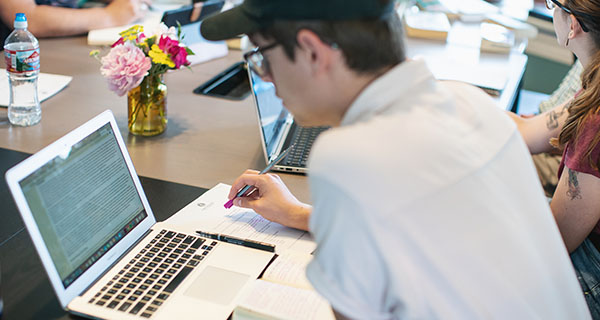
By Lit Fest 2019 Intern Ken Thompson
Editor's Note: This is the third in a series of posts written by Lit Fest 2019 interns tasked with sharing notable experiences during the festival's two weeks. You can read the first here, and the second here.
What is your definition of voice in writing?
This was one of the many questions discussed in BK Loren’s “Beyond Plot” class that led to helping me find my voice. She brought her genuine voice to help me and others find and cultivate our own authentic voice.
My name is Ken Thompson and I had the opportunity to intern at Lighthouse for their 14th annual Lit Fest event. I’ve been writing self discovery and personal growth nonfiction articles for the past four years in a personal blog (https://coacht.blog) but have always been intrigued by fiction stories. At the beginning of 2019 a fiction story idea came to my mind, but I have struggled with it. One of the struggles I’ve been having in writing this story was not knowing whose perspective to tell the story from. In nonfiction writing I'm used to telling real stories with my words but with fiction I was wondering how I could add other characters and their perspectives to a story.
In BK’s class I discovered that I had been trying to tell this story with a voice that wasn’t completely unique to who I am: my experiences, feelings, all the things that make someone an individual. These unique characteristics in each person are what distinguish one writer's voice from another. I’m sure you are able to distinguish your favorite author’s writings from someone else, as I am too with my favorites. These authors use their voice even when they are writing dialogue between different characters. They write what they know and each of their characters in some way relates to the author.
The character I know best is me. The character you know best is you. I found that part of what voice is about is being able to bring parts of ourselves into each character and page. This all reminds me of a Stephen King quote: “Fiction is a lie. And GOOD fiction is the truth inside the lie.”
We worked on a range of writing exercises throughout this class. One of the exercises that helped me the most was to create a one-page poem summarizing my story to capture the essence and voice of it. This helped me zooom in and focus on the essential parts of my story.
I still have a lot to learn but I'm closer to figuring out how to use my voice throughout my story in each character and on each page.
I also had the joy of participating in Paula Younger’s “Idea Generator” craft seminar. The title of this class was not misleading as it focused on generating ideas throughout different parts of a person’s story. In writing my fiction story I've been second guessing where to start and how to transition into the next scene. This class provided me with practical writing exercises to help transition into the next moment, scene, page, chapter.
One of the most helpful exercises for me in this class was an exercise called “What If. How to Develop and Finish Stories.” There are times when my writing seems to just flow and then there are times when my focus gets narrowed and I have a hard time figuring out what to write next. I plan on doing this exercise over and over again whenever I am experiencing limited thinking/writer’s block.
The “What If” exercise consists of first writing the words “What If” on the top of a page. Then write five to ten ways of continuing your story to the next event, scene, etc. Allow yourself to be as creative as possible. You don’t need to make any concrete decisions at this point in your story; give yourself the freedom of options. As you write out multiple “what if” options for where your story could go next you'll begin to get a clearer idea of where you want it to go. This exercise helped me a lot!
If you want to continue this exercise you can choose a “what if” scene you’re feeling good about and write a scene with that scenario for five minutes without worrying about finishing it. No writing is wasted even if it doesn’t end up in your final draft. Writing in a way is like evolution: many different forms are created—some ideas and words work out, survive and thrive, while others do not.
Overall I had an amazing experience at Lit Fest. I learned so much and thoroughly enjoyed the thoughtful and relaxed atmosphere at Lighthouse.
Ken Thompson is a M.Ed. graduate from Indiana University of Pennsylvania where he also received his Bachelors of Science and ran middle-distance on the University’s track team. He has taught a range of subjects since 2015 and currently teaches acting classes at Colorado School of Acting. Ken loves acting, writing, philosophizing and discussing ideas, athletics, nature, and learning. He has been blogging for the past four years and last summer received an internship with the best selling author Ryan Holiday. You can find the story of how that internship came to be and more on his panda personified blog “https://coacht.blog." Ken loves being around an environment of writers and appreciates Lighthouse’s welcoming community.

